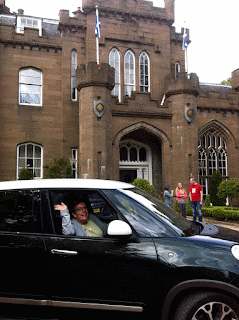I recently watched the film “Me and Earl and the Dying Girl.”
It’s the quirky, wistful story of a high school senior guy, Greg, and his classmate,
Rachel, who has leukemia. He announces early on that the movie is not going to
be a romance. Even so, as their “just-friends” relationship deepens, Greg panics.
Having always preferred superficial friendliness and invisibility over
intimacy, Greg finds that true friendship leaves him alarmingly exposed, both to
Rachel and to others. Intimacy, it turns out, requires vulnerability.
In America, it’s easier for me to be invisible than it was in
Cambodia. Partly because my ethnicity doesn’t stand out here. Partly because I
don’t live in a fishbowl, where my housemates double as colleagues and the kids
in my classes run into me at church, cafés, and even vacation spots. Partly
because I have more material comforts (heating and A/C, access to stores, a
car), and so I can hide or placate my stress more easily. Many friends have
observed that problems which seemingly lay docile under America’s wall-to-wall
carpet started poking their heads out when my friends moved to Cambodia, the
land of tile floors and very small rugs. If I’d claimed, “I’m totally fine,
nothing’s wrong,” they would have laughed and said, “OK, now what’s the real story?”
But even for Cambodians, life seems a bit more public. On my
route to school, I could see into many homes and stores. I could make eye
contact with kids biking to school, street vendors pushing carts of meatballs, and
mechanics patching tires in basins of grimy water. If I didn’t want to know the
extent of a moto crash victim’s injuries, it was up to me to look away. Day care
isn’t really a thing, and many families run businesses out of their homes, so I’d
see babies in hammocks and toddlers wandering around when I’d stop in somewhere
to buy phone credit or print out worship lyrics. In the US, when have I entered
a stranger’s home?
Cambodians are silent about some of their deepest struggles. For
example, domestic abuse is rampant, and yet women rarely admit to being victims.
But while their neighbors are unlikely to confront the perpetrators, they can often
hear the yells and cries through the walls. They know. It’s harder to keep
secrets in that environment.
As a Christmas gift, my parents took me to an off-Broadway
adaptation of C.S. Lewis’s The Great Divorce, an allegory of people in hell who take a tour of heaven – and mostly hate
it. The grass pierces through their feet because it’s fully real and they’re
only ghosts in comparison. They’re forced to spend time with people they’ve
spent a lifetime despising. And the weakness and selfishness are exposed in
what they claim as their greatest strengths. They’d prefer to return to hell in
order to keep their pride intact. In hell, nobody needs other people, and
everyone can get a new house just by thinking about it, so the grey town
expands ad infinitum as people quarrel and move away from those who offend or
bother them. As one explains, he could tolerate it if it weren’t for the utter loneliness. The characters in heaven are baffled. How can the visitors look right at the joy, the beauty, the love of God, and still reject it in order to have things their own way? Lewis' answer: It's the choice they've made all their lives.
The grey town is much easier for me to imagine in a US context than in a Cambodian one. While being in close community wasn’t always easy, forced friends were one of my favorite things about my life in Cambodia. This week I’ve had the delight of meeting up with three of them: Megan Roberts was visiting family in Philly, and now I’m in Orlando with Amy Uecker and Annalisa Benner for Annalisa’s wedding. Our conversations have been deep and open, just like old times, and I really love it.
The grey town is much easier for me to imagine in a US context than in a Cambodian one. While being in close community wasn’t always easy, forced friends were one of my favorite things about my life in Cambodia. This week I’ve had the delight of meeting up with three of them: Megan Roberts was visiting family in Philly, and now I’m in Orlando with Amy Uecker and Annalisa Benner for Annalisa’s wedding. Our conversations have been deep and open, just like old times, and I really love it.
I was worried last year that returning to the US would leave
me isolated. How many people in America are really honest about the hard things
in their lives, the way my friends were in Cambodia? A surprising number, in my
experience. In the past 6 months, besides deepening my relationship
with my parents and renewing a few close friendships, I’ve also met a number of
people who have been refreshingly honest about their brokenness, pain, and
regrets. The kids I nanny seemed so innocent and happy when I first started
working with them. Now I’ve witnessed their selfishness, deceit, and fear. I’ve
heard and seen manifestations of grief over their adoptive mom’s death last
year following a brief illness. I’ve seen these kids at their worst (I think!),
and I’m glad for it. While invisibility is an option in America, it’s not the
only one available. Many people around me here recognize the value of
intimacy and have chosen to ditch the rug instead of sweeping junk under it.

















































